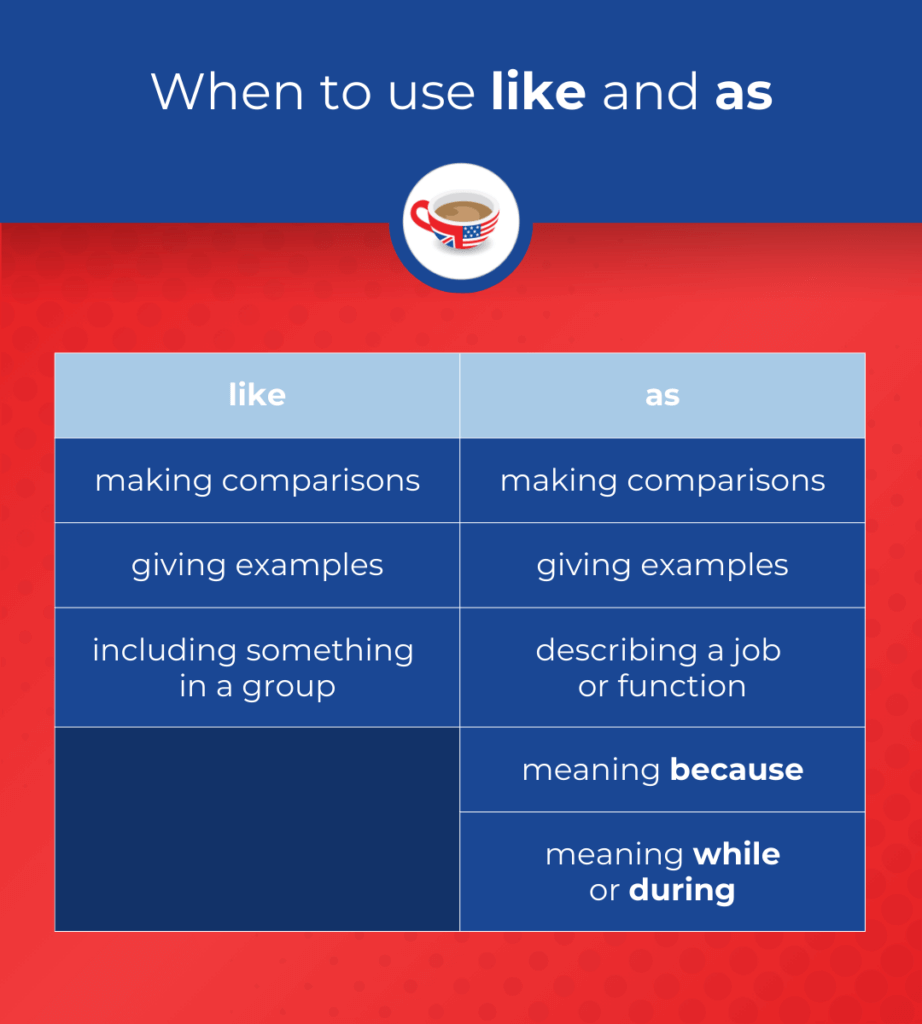Do you know the difference between like and as when you’re speaking English?
Using like and as can be a difficult topic for English learners, because these words can be used in similar ways.
The Coffee Break English Show is a podcast series of bite-sized, friendly conversations to help you understand some difficult topics in English. In the latest episode, Josie and Mark talk about the rules for when to use like and as, and they give examples to help you to remember them.
Plus, don’t miss our free worksheet at the end to practise deciding between like and as in English!
So, let’s get started and look at the rules for like and as. Why not get a cup of coffee or tea to enjoy while you read and listen to the podcast episode?
Making comparisons using ‘like’ and ‘as’
We use like + noun to compare two or more real things, and say that they are similar. Here are some examples:
She’s like my mother.
My shirt is like your shirt.
My perfume smells like flowers.
He looks like a famous actor.
We use like + subject + verb, or as if + subject + verb to compare something real to something imaginary, or not real. Here are some examples:
Mark, you look like you’ve seen a ghost!
Mark, you look as if you’ve seen a ghost!
= Mark looks very scared, but he hasn’t really seen a ghost.
It feels like it’s 50 degrees in this studio.
It feels as if it’s 50 degrees in this studio.
= The temperature in the studio is very hot, but it isn’t 50 degrees.
There’s just one more comparison to talk about now. We use as + adjective/adverb + as to compare two things, and say that they are equal. Here are some examples of this:
I can run as fast as you.
This pizza is as delicious as the pizza I ate in Italy.
He is not as tired as he was yesterday.
Giving examples using ‘like’ and ‘such as’
We use both like and such as to give examples of things. Let’s look at some examples:
Why don’t you try a new hobby, like tennis?
Why don’t you try a new hobby, such as tennis?
I’ll bring some snacks, like popcorn.
I’ll bring some snacks, such as popcorn.
Saying something is part of a group using ‘like’
We use like when we’re talking about a group of people or things, and we want to mention something which is part of that group. Here, like means “including”. Here are a few examples:
Lots of young people, like my cousin, go to university after they finish school.
Like many cities, Paris has a metro system.
Describing a job or function using ‘as’
We use as to describe the job or the function of something. Let’s look at some examples:
He works as an architect.
I didn’t have a knife, so I used my spoon as a knife.
She wears an old t-shirt as pyjamas.
Using ‘as’ to mean ‘because’
As can also mean “because”. Here are some examples:
I didn’t go to the beach as the weather wasn’t very good.
As I had a doctor’s appointment, I arrived late to work.
She has lots of work to catch up on, as she was on holiday last week.
Using ‘as’ to mean ‘while’ or ‘during’
Finally, as can also mean “while” or “during”, so we use it when two actions happen at the same time. Here are the final examples that Josie and Mark mention in this episode:
She called her husband as she left work.
It started raining as I got home.
As we got to the station, the train was leaving.
A visual summary of when to use ‘like’ and ‘as’

Keep practising using ‘like’ and ‘as’
These little words can be confusing, so why not review the rules and write your own example sentences with like and as?
For a little more practice, download the free worksheet below and see how much you’ve learned about using ‘like’ and ‘as’.
If you found this post interesting, make sure you listen to the full podcast episode with Mark and Josie on The Coffee Break English Show. We will release more episodes soon, about some more useful topics! Subscribe to our podcast feed and our channel on YouTube to learn when the next episode is available.
Plus! To get regular free English lessons in your inbox, you can sign up for our email lessons. We regularly send short (coffee-break-sized) email lessons that will help you improve your English. You will also hear from Mark, the founder of Coffee Break Languages, giving advice for language learners at any level. Sign up below!
So, keep practising like and as! Remember that all English learners make mistakes, but people can usually still understand you. It’s all part of the language-learning journey.
Happy Coffee Breaking!



